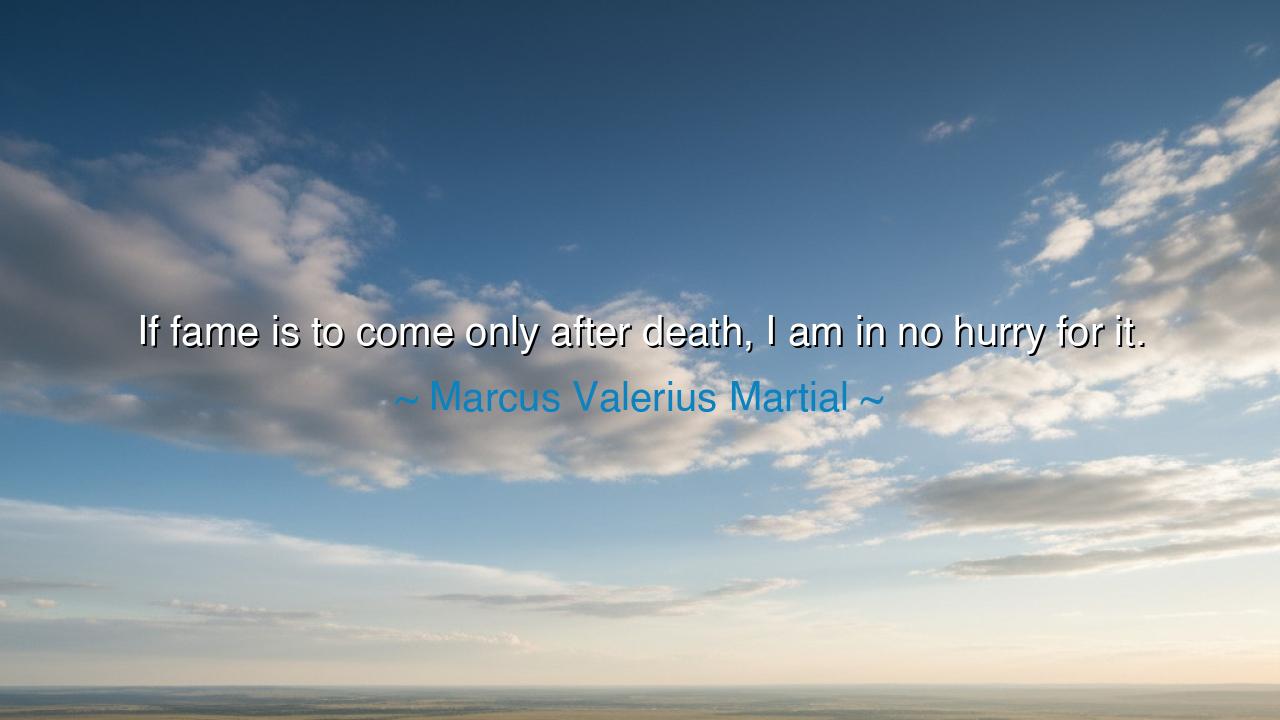
If fame is to come only after death, I am in no hurry for it.






“If fame is to come only after death, I am in no hurry for it.” – Marcus Valerius Martial
In the twilight of Rome’s golden age, when poets sang to emperors and philosophers contended in marble halls, there lived a man named Marcus Valerius Martial—a poet whose tongue was as sharp as his wit, and whose eyes saw deeply into the follies of men. It was he who wrote, with both irony and wisdom, “If fame is to come only after death, I am in no hurry for it.” Though spoken in jest, these words shine like ancient bronze, carrying the weight of a timeless truth: that life itself, not fame, is the true treasure, and that to live fully is better than to be remembered vaguely in the ages to come.
Martial lived in a world where the pursuit of glory was both a religion and an obsession. The poets of Rome wrote for the applause of emperors, and warriors fought for the wreath of immortality—one that too often came at the cost of blood and peace. Yet Martial, ever the realist, laughed at this madness. He understood that fame after death is but an echo in the wind, heard by others when the speaker has long turned to dust. What joy is there, he asks, in being praised by lips you will never hear? What warmth is there in the love of strangers when your heart has ceased to beat? Better to live, to laugh, to savor the sun while it still shines, than to chase the cold illusion of eternal renown.
In his epigrams, Martial mocked the vanity of men who built monuments to themselves, who traded their peace for posterity, who wrote not for beauty but for remembrance. He knew that the hunger for fame can consume the soul—that it turns creation into calculation, and art into ambition. To him, the wise man was not the one who sought to be praised forever, but the one who found contentment in the present, who walked through life unchained by the judgments of others. “Let others build pyramids,” he seemed to say. “I will build moments of joy.”
The history of the world is filled with those who learned too late what Martial knew early. Consider Vincent van Gogh, the painter of light and sorrow. In his lifetime, he sold almost nothing, mocked and misunderstood by those around him. Yet after his death, the world bowed before his genius, and his name became immortal. But what did this fame matter to him, who died in despair? What good is glory that cannot heal the living heart? His life reminds us that recognition without presence is hollow—that the praise of the future cannot fill the emptiness of today.
And yet, Martial’s words are not a rejection of greatness—they are a defense of living greatness. He does not tell us to shun mastery, but to find joy in the doing, not in the memory of the done. To write, to build, to teach, to love—these are noble acts not because they earn us immortality, but because they are expressions of life itself. Fame may come, or it may not; but what matters is that we lived honestly, that we gave the best of ourselves while the breath of time still filled our lungs. For the wise man knows that eternity begins not after death, but in every moment of conscious living.
O children of the future, remember this: do not measure your worth by the applause of others, for applause fades like dust in the wind. Seek instead the quiet victory of a fulfilled soul. If your art, your labor, or your kindness touches even one heart while you live, you have already conquered death. Do not wait for fame; let meaning be your companion, and joy your reward. For when you live with purpose, you have already achieved what monuments and legends can never grant—you have tasted immortality in the present moment.
The lesson is eternal: live not for memory, but for life. Work not for the tombstone’s inscription, but for the living heartbeat of creation. When you act, act with love; when you speak, speak with truth; when you dream, dream with courage. And if fame should come, let it come as a shadow following the light of your being—not as the sun you chase, but as the dawn you leave behind. For fame after death is but the echo of a voice once alive, but joy in life—that is the voice itself, singing while the world still listens.






AAdministratorAdministrator
Welcome, honored guests. Please leave a comment, we will respond soon